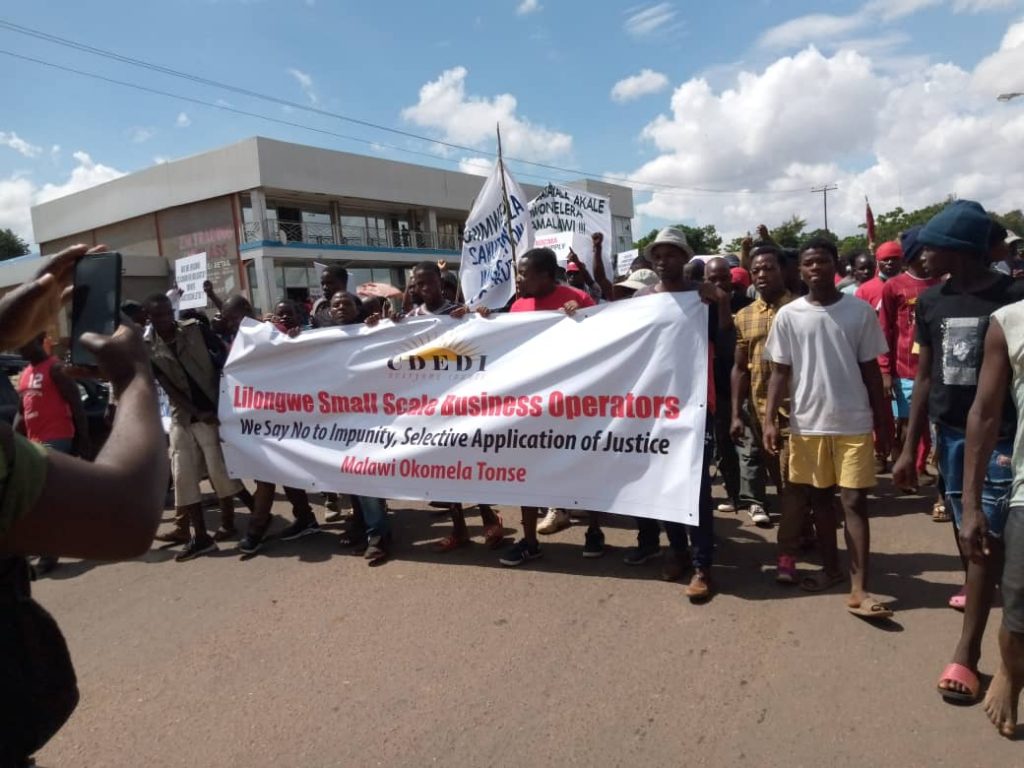By Watipaso Mzungu

Malawi’s cities and major towns are expected to host a new wave of nationwide protests next Wednesday, April 21, 2021, as the Centre for Democracy and Economic Development Initiatives (CDEDI) takes to the streets to protest against ‘government’s punitive taxes, high levies and interest rates on loans and essential services and commodities’.
CDEDI executive director Sylvester Namiwa said since the government had defied their seven-day ultimatum to scrap off the value added tax (VAT) and other taxes of essentials goods such as edible cooking oil, his organization will now proceed to mobilize Malawians to hold nationwide demonstrations.
“The punitive taxes, levies and interest rates are not helping anyone as evidenced by the smuggled products which are not bringing any revenue to the country. The development is forcing the local industries to either shut down completely or downsize their workforce and operations. In this kind of set up, Malawians are losing jobs on one hand and government is losing taxes on the other hand. As a result this has further led to yet another problem the influx of foreign nationals that are living in Malawi illegally, doing illegal business in undesignated premises,” said Namiwa.
The CDEDI boss made the sentiments during a press briefing he held alongside concerned citizens in Lilongwe.
Namiwa disclosed that the K6.2 billion Covid-19 funds feared to have been looted by public officers will form part of the agenda for the nationwide protests.
He emphasized that the punitive taxes are depriving Malawians of the pride that goes with buying locally manufactured products simply because they are expensive due to high cost of production.
He said this is why CDEDI has been demanding a review and subsequent removal of some of the taxes and levies on fuel, water and electricity in order to reduce cost of production thereby making the products affordable to the ordinary Malawians.
Namiwa contended that in so doing, the government will be protecting the marginalized from hazardous smuggled products that have flooded the local market at the same time allow the local industry to flourish thereby creating more jobs and remit revenues to government through taxes.
“In an ideal situation CDEDI and well-meaning Malawians expected the Tonse Alliance Government under President Dr. Lazarus Chakwera to utter a word on recent closure of Kanengo Tobacco Processors Limited in Lilongwe; Bakhresa Group of Companies in Mzuzu and more recently, Manica Limited. As an advocacy institution on human rights, CDEDI has come to stand with the voiceless, and we are insisting on our demand that government should scrap off such taxes such as VAT on cooking oil, take out all the unjustifiable levies on fuel and electricity and immediately embark on a review process of the tax laws. This will in turn push down the high cost of living among Malawians,” he said.
He stated that besides improving the welfare of Malawians in general, the move would have made Malawi attractive for foreign direct investment and guarantee the realization of creating one million jobs.
“While CDEDI and indeed Malawians of good will were busy asking government to embark on an exercise to review the tax policies, the citizens woke up to the news that the Reserve Bank of Malawi (RMB) had approved a blanket increase of interest rates on loans in total disregard of its policy that Ministries, Government Departments and Agencies (MGDA) should set a certain percentage to buy from Small and Medium Enterprises (SMEs).It is an open secret that for our SME’s to benefit from this policy direction the central bank should create incentives to commercial banks to give out affordable loans for such business,” narrated Namiwa.
One of the concerned citizens, Vincent Mtambalika, who had travelled all the way from Mchinji to grace the presser, said the taxes have exposed his family to uncertified products imported from Mozambique and Zambia.
Mtambalika feared that this would eventually affected his family.
“We are pleading with the government to review these taxes. Otherwise, we will all die because of consuming bad products,” he said.


